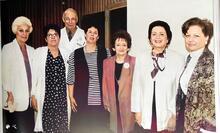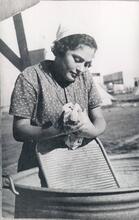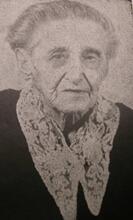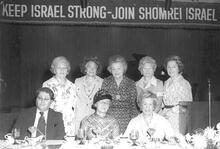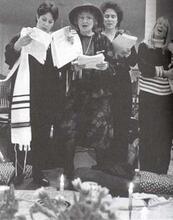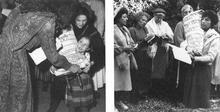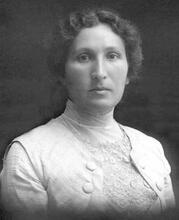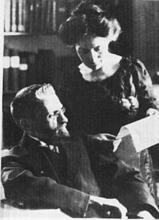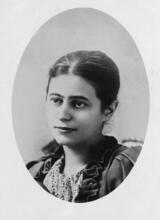Cecilia Klaften
Cecylia Klaften was a pedagogue, a civic activist, a Zionist, and a campaigner for women’s issues active in Galicia and later in Eastern Lesser Poland. After receiving her PhD in zoology in 1913, she became actively evolved in the social welfare of the Jewish community during World War I. She was a trailblazer of Jewish vocational schools for women in Galicia and co-founder of the Jewish Women’s Association (established 1925) and the WIZO Jewish Women’s Organization for Pro-Palestinian Work (established 1929) in Lvov. She was also politically active in the Lvov City Council in the 1930s. Klaften was murdered by the Nazis in 1942.
From Tarnopol to Lemberg/Lvov
Cecylia Klaften (née Beigel; also spelled Cecylja Klaftenowa) was one of the most important Jewish education specialists in Lemberg/Lvov (today Lviv/Ukraine) before and after World War I. She was born in 1881 (some sources indicate 1883) in Tarnopol (today Tarnopil/Ukraine), where she attended school. Beginning in 1902, Klaften studied at a state seminary for women, followed by natural sciences, psychology, philosophy, and literature at the University of Lemberg. In 1913, she received her doctorate in experimental zoology, also from the University of Lemberg. From 1907 until 1920 Klaften worked at the Institute for Biology at Lvov’s Jan Kazimierz University. She then served as the principal of a professional school for Jewish women in Lvov. She was married, but her husband passed away a few months after their marriage. Klaften had no children. Her entire life was devoted to the underprivileged, mainly women, in Galician Jewish society.
Social Commitment for Jewish Society during World War I
The First World War marked the beginning of Klaften‘s social engagement, when she began supporting the poor, children, and adolescents among the Jewish community. During the war, she established a children's home in cooperation with the Jewish Rescue Committee and set up a common kitchen.
Klaften was also one of the founding members and president of the organization “Handcraft Workshops for Jewish girls in Lvov“ (Warsztaty Rᶒkodzielnicze dla Dziewcząt Żydowskich we Lwowie), established in 1915. The organization‘s goal was to set up and run handcraft workshops for girls in Lvov and elsewhere in Galicia in order to provide young Jewish women with general vocational training. Until then, no such educational institute existed for women in Galicia. The workshops taught and employed over 200 women in 1916 and 1917. Later the workshops were transformed into vocational schools for Jewish women in Lvov and other cities.
“Mother of the Galician Jewry": A Famous Pedagogue and Trailblazer
After World War I, in 1919, Cecylia Klaften became a member of the so-called "Rescue Committee" (Komitet Ratunkowy), which provided assistance to the Jewish population and victims of the pogroms in Galicia. The same year, she also established a vocational boarding school for Jewish women with the financial support of the Joint Distribution Committee (JDC). Later, this school became one of the most famous professional schools in Lvov, with Klaften as its principal. It existed until 1939. Interwar Lvov was also home to two private Jewish vocational schools for boys: the “Abraham Korkis school” and the “Marek Bernstein school“. Klaften was a member of the school commission at both schools.
Klaften was thus the pioneer of vocational guidance for girls, women, and mothers. With her initiative, vocational education centers for girls were opened all over the region, many of them Zionist-oriented. Many Jewish girls acquired vocational training, largely in traditional women's vocations, but Klaften did not limit herself only to vocational education of Jewish girls. In 1923, she founded the social and educational organization WUZET (Society for the Promotion of Vocational Training among Jews in Lesser Poland; in Polish Towarzystwo Szerzenia Wykształcenia Zawodowego wśród Żydów Małopolski), based in Lvov, which worked throughout East Lesser Poland (formerly Galicia) during the interwar period. This organization set itself the task of representing the Jewish vocational school system locally and at the state level. Its goal was to spread and support the idea of productivity incentives for Jews and the unification of the various organizations dealing with vocational education. WUZET founded many schools and private educational courses for destitute adolescents. However, the Polish state government confirmed the statute establishing WUZET only in 1925, a delay perhaps because of discrimination against Jewish and women’s organizations. At that time, WUZET was comprised of nine vocational schools for women, three craft schools for men, two vocational training schools (one for men and one for women), and five craft boarding schools in Lvov, Przemyśl, Stryj, Stanisławów (today Ivano Frankivsk), Kołomya, and other cities in East Lesser Poland. In the 1930s, WUZET ran 20 schools with 2200 Jewish pupils. Klaften thus forged a network of vocational schools for boys and girls, in which especially many Jewish girls in interwar East Lesser Poland acquired a profession.
In 1938, WUZET also founded an agricultural school associated with Baron Maurice de Hirsch’s foundation. Hirsch (1831–96) was one of the most important German Jewish philanthropists of the late nineteenth century and engaged in charity work especially in Galicia. His foundation aimed to develop a Jewish school system and worked closly with local Jewish organizations.
Local and Global Activist and Campaigner for Women’s Issues
Cecylia Klaften was involved not only in educational and vocational training projects for young Jews but also in local Jewish organizations, where she promoted the emancipation of Jewish women in Lvov.
Beginning in 1925, Klaften served as a member of the Board of Trustees for the Preservation of Jewish Art Monuments (Kuratorium Opieki nad Zabytkami Sztuki Żydowskiej) of the Jewish Religious Society in Lvov, where she maintained contact with pupils. In addition, she was a member of the board of directors of the “Jewish Central Emigration Society“ (JEAS) (Żydowskie centralne towarzystwo emigracyjne w Polsce).
Klaften was also one of the founders of Lvov’s “Jewish Women's Association“ (Związek Kobiet Żydowskich, 1925-1939), which had branches throughout East Lesser Poland; she served on its executive board until 1939. The Jewish Women’s Association strove to empower Jewish women and provide them with a good quality of life through professional, educational, and cultural endeavours, as well as by providing aid to single mothers and children. It maintained its own employment agency, craft workshops, an orphanage, and a shelter for homeless and travelling women; it also conducted a series of social campaigns, organized lectures on women's rights and awareness-raising talks, and fought against prostitution, trafficking of women, begging, and vagrancy. The association was also involved in setting up temporary information desks at railway stations for women travelling alone in search of work. In 1929, members of this organization helped to found the Jewish Women’s Organization for Pro-Palestinian Work as a branch of the Women's International Zionist Organization in Lvov, and Klaften became one of its main active members. During the 1930s, Cecylia Klaften was also an active speaker, giving talks in organizations such as “Leopolis“ in Lvov, and she published many articles in Głos Kobiet, the WIZO women’s section of the journal Chwila, published in Lvov.
Recognition and Legacy
In 1920 and 1924, Klaften served as a delegate and participant at the Jewish World Relief Conference in Carlsbad, where women were badly underrepresented.
To honour her social activities, in 1931 Klaften received the Polonia Restituta, the second highest civilian award of the Second Polish Republic. In addition, she became a political activist in the city of Lvov and served on Lvov’s town council. In 1928, she was one of the seven Zionist party delegates—and the only woman—who were nominated to the city‘s town council and was a member of it in 1929 and in 1932. Two years later, in 1934, she ran for representative of the 4th district (list of Jewish candidates, number 1) with the support of the United Committee of Jewish Women's Organizations and won a mandate. In May 1939, shortly before the outbreak of the Second World War, she was again elected by the second Jewish National (Zionist) list of candidates to Lvov‘s town council.
During the Second World War, with the Soviet (1939 to 1941) and German (1941 to 1944) occupations of Lvov, Cecylia Klaften continued her work for the Jewish community. She was murdered by the Nazis in Lvov in 1942.
Beigel-Klaften, Cecylia. “Über Plasmastrukturen in Sinnesorganen und Drüsenzellen des Axolotls [On plasma structures in organs of perception and adenocytes of the Axolotl]. ” In Archiv für mikroskopische Anatomie [Archive for microscopic anatomy], ed. O. Hertwig/ W. von Waldeyer-Hartz, 39-60. Berlin/Bonn: Verlag Friedrich Cohen, 1918). Accessed September 5, 2019. http://www.archive.org/stream/archivfrmikros901berl/archivfrmikros901be…
Center for Urban History of East Central Europe. “Cecelia Klaften.” Lviv interactive Encyclopedia. Accessed September 19, 2019. https://lia.lvivcenter.org/uk/persons/klaftenowa-cecylia/
Chwila (Moment), no. 2252, June 24, 1925, 4; no. 3920, February 22, 1930, 12; no. 3969, April 11, 1930, 11-12.
Dolganov, Petro. “Цецилія Кляфтен [Cecilia Klaften].” Accessed October 20, 2019. http://mnemonika.org.ua/2018/10/16/kliaften/
Friedman, Dr. P. “Extermination of the Lvov Jews.” In The Encyclopaedia of the Jewish Diaspora, Poland Series: Lwow Volume. Lviv: 1956.
Gelber, N.M. ed. History of the Jews of Lwow. Jerusalem/Tel Aviv: Encyclopaedia of the Jewish Diaspora, 1956.
Accessed October 30, 2019. https://www.jewishgen.org/yizkor/lviv/lvi593.html
Haliczanin. Kalendarz Humorystyczny. Ilustrowanany Noworocznik dla Wszystkich [Humorous calendar. [Ilustrated calendar for the new year for everybody] 1930, 1933. Accessed May 6, 2020.
https://jbc.bj.uj.edu.pl/dlibra/publication/334550/edition/319712?langu…
Hecht, Dieter J. “The Jewish World Relief Conference in Carlsbad, 1920 and 1924. A Struggle for European Jewish Self Determination.” Judaica Bohemiae XLV-1 (2010): 5–69.
JDC Archives. “Translation Letter from Dr. Cecilia Klaften.” Accessed October 20, 2019.
http://search.archives.jdc.org/notebook_ext.asp?item=228381&site=ideaal…
Łapot Mirosław. “Cecylia Klaften (1881–194?) Pionierka żydowskiego szkolnictwa zawodowego we Lwowie i w Małopolsce w okresie międzywojennym [Jewish pioneer of vocational schools in Lwow and in Lesser Poland during the interwar period].” In Polsko-Ukrainski Rocznik, XIII, Kształcenie zawodowe: Pedagogika i Psychologia, ed. Tadeusz Lewowicki, Jolanta Wilsz, Iwana Ziaziuna, and Nelli Nyczkalo, 357-369. Czᶒstochowa/ Kijów: Wydawnictwo Akademii im. Jana Długosza w Częstochowie, 2011.
Łapot, Mirosław. “The history of Marek Bernstein Jewish Vocational School in Lviv (1864-1939).” In Вісник Львівського університету. Серія педагогічна [Visnyk of Lviv University. Series Pedagogics]. Issue 30 (2016): 176–187.
Museum of the History of Polish Jews Polin. Virtual Shtetl. “Jewish Women's Association in Lviv 1925−1939 and WIZO 1929−1939.” Accessed September 23, 2019. https://sztetl.org.pl/en/towns/l/703-lwow/101-organizations-and-associa…
Pinkas Hakehillot, Encyclopaedia of Jewish Communities, Poland. Vol. II, Eastern Galicia, Jerusalem 1980, 20.
Polona. “Do Kobiety Żydowskiej! [To the Jewish Women”].” Accessed September 15, 2019.
https://polona.pl/item/do-kobiety-zydowskiej-inc-wyborczynie-iv-okregu-…
Rᶒdziński, Kazimierz. “Żydowskie szkolnictwo zawodowe w Małopolsce [Jewish vocational school system in Lesser Poland] (1918-1939).” In Prace Naukowe AJD [Scientific works AJD]. Pedagogika 15 (2006), 159–172.
Romantsov, Roman. “Polityka władz polskich wobec żydowskiego szkolnictwa
zawodowego we Lwowie [The policies of the Polish government towards the Jewish vocational school system in Lvov] 1919–1939.” In Wschód Europy. Studia humanistyczno-społeczne [The Central European Journal of Social Sciences and Humanities]. vol. 3 (1) (2017), 97–119. DOI 10.17951/we.2017.3.1.97. Accessed September 23, 2019. http://cejsh.icm.edu.pl/cejsh/element/bwmeta1.element.ojs-doi-10_17951_…
Sroka, Łukasz Tomasz. “Stowarzyszenie Humanitarne „Leopolis” we Lwowie. Głowne kierunki działalności [The humanitarian Association ’Leopolis’ in Lvov] (1899–1938).” In Kwartalnik Historyczny [Quarterly Historical Journal]. Rocznik CXXIII 1 (2016), 45–69.
Wallach, Kerry. “Paths of Modernity. Jewish Women in Central Europe.“ In The Wiley-Blackwell History of Jews and Judaism, ed. Alan T. Levenson, 422-440. Chichester: Blackwell Publishing, 2012.
Yones, Eliyahu. Smoke in the Sand. The Jews of Lvov in the War Years 1939-1944. Jerusalem: Gefen Publishing House, 2004.
Żydowski Instytut Historyczny [The Jewish Historic Institute]. Polski Słownik Judaistyczny [The Polish Dictionary of Jewish Studies]. “Klaften Cecylia.” Accessed October 30, 2019.
https://www.jhi.pl/psj/Klaften_(Klaftenowa_z_domu_Beigel)_Cecylia
Pollack, Chana: Cecylia Klaften Educated Polish Girls, April 24, 2014, Accessed January 16, 2020, https://forward.com/sisterhood/197064/cecylja-klaften-educated-polish-g…


